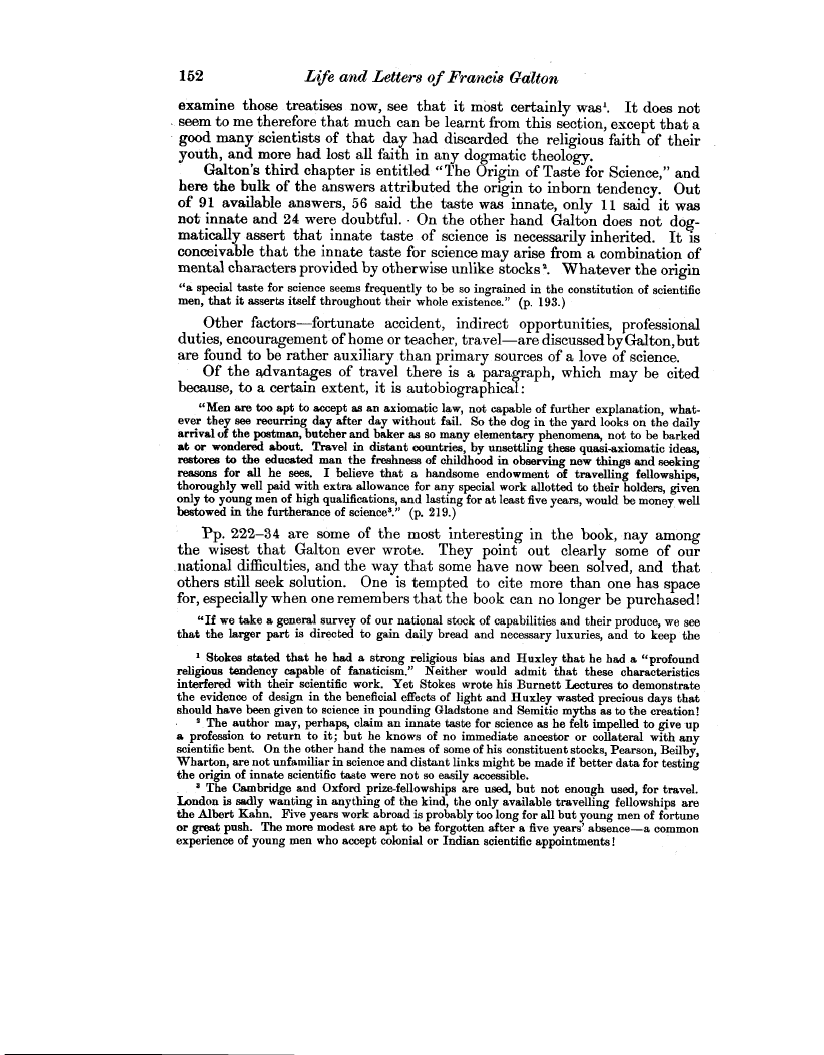152 Life and Letters of Francis Galton
examine those treatises now, see that it most certainly was. It does not seem to me therefore that much can be learnt from this section, except that a good many scientists of that day had discarded the religious faith of their youth, and more had lost all faith in any dogmatic theology.
Galton's third chapter is entitled "The Origin of Taste for Science," and here the bulk of the answers attributed the origin to inborn tendency. Out of 91 available answers, 56 said the taste was innate, only 11 said it was not innate and 24 were doubtful.. On the other hand Galton does not dogmatically assert that innate taste of science is necessarily inherited. It is conceivable that the innate taste for science may arise from a combination of mental characters provided by otherwise unlike stocks'. Whatever the origin
"a special taste for science seems frequently to be so ingrained in the constitution of scientific men, that it asserts itself throughout their whole existence." (p. 193.)
Other factors-fortunate accident, indirect opportunities, professional duties, encouragement of home or teacher, travel-are discussed by Galton, but are found to be rather auxiliary than primary sources of a love of science.
Of the advantages of travel there is a paragraph, which may be cited because, to a certain extent, it is autobiographical:
"Men are too apt to accept as an axiomatic law, not capable of further explanation, whatever they see recurring day after day without fail. So the dog in the yard looks on the daily arrival of the postman, butcher and baker as so many elementary phenomena, not to be barked at or wondered about. Travel in distant countries, by unsettling these quasi-axiomatic ideas, restores to the educated man the freshness of childhood in observing new things and seeking reasons for all he sees. I believe that a handsome endowment of travelling fellowships, thoroughly well paid with extra allowance for any special work allotted to their holders, given only to young men of high qualifications, and lasting for at least five years, would be money well bestowed in the furtherance of sciences." (p. 219.)
Pp. 222-34 are some of the most interesting in the book, nay among the wisest that Galton ever wrote. They point out clearly some of our .national difficulties, and the way that some have now been solved, and that others still seek solution. One is tempted to cite more than one has space for, especially when one remembers that the book can no longer be purchased!
"If we take a general survey of our national stock of capabilities and their produce, we see that the larger part is directed to gain daily bread and necessary luxuries, and to keep the
1 Stokes stated that he had a strong religious bias and Huxley that he had a "profound religious tendency capable of fanaticism." Neither would admit that these characteristics interfered with their scientific work. Yet Stokes wrote his Burnett Lectures to demonstrate the evidence of design in the beneficial effects of light and Huxley wasted precious days that should have been given to science in pounding Gladstone and Semitic myths as to the creation!
s The author may, perhaps, claim an innate taste for science as he felt impelled to give up a profession to return to it; but he knows of no immediate ancestor or collateral with any scientific bent. On the other band the names of some of his constituent stocks, Pearson, Beilby, Wharton, are not unfamiliar in science and distant links might be made if better data for testing the origin of innate scientific taste were not so easily accessible.
s The Cambridge and Oxford prize-fellowships are used, but not enough used, for travel. London is sadly wanting in anything of the kind, the only available travelling fellowships are the Albert Kahn. Five years work abroad is probably too long for all but young men of fortune or great push. The more modest are apt to be forgotten after a five years' absence-a common experience of young men who accept colonial or Indian scientific appointments !

